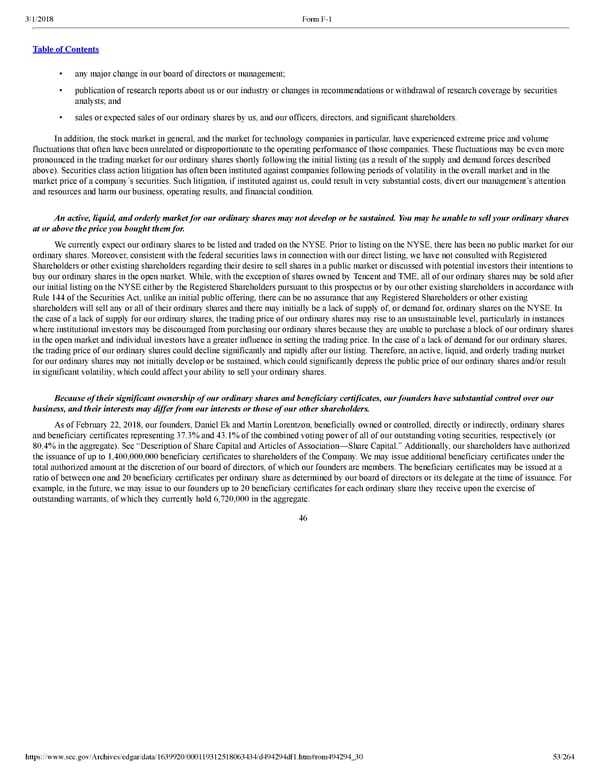53/264 • any major change in our board of directors or management; • publication of research reports about us or our industry or changes in recommendations or withdrawal of research coverage by securities analysts; and • sales or expected sales of our ordinary shares by us, and our officers, directors, and significant shareholders. In addition, the stock market in general, and the market for technology companies in particular, have experienced extreme price and volume fluctuations that often have been unrelated or disproportionate to the operating performance of those companies. These fluctuations may be even more pronounced in the trading market for our ordinary shares shortly following the initial listing (as a result of the supply and demand forces described above). Securities class action litigation has often been instituted against companies following periods of volatility in the overall market and in the market price of a company’s securities. Such litigation, if instituted against us, could result in very substantial costs, divert our management’s attention and resources and harm our business, operating results, and financial condition. An active, liquid, and orderly market for our ordinary shares may not develop or be sustained. You may be unable to sell your ordinary shares at or above the price you bought them for. We currently expect our ordinary shares to be listed and traded on the NYSE. Prior to listing on the NYSE, there has been no public market for our ordinary shares. Moreover, consistent with the federal securities laws in connection with our direct listing, we have not consulted with Registered Shareholders or other existing shareholders regarding their desire to sell shares in a public market or discussed with potential investors their intentions to buy our ordinary shares in the open market. While, with the exception of shares owned by Tencent and TME, all of our ordinary shares may be sold after our initial listing on the NYSE either by the Registered Shareholders pursuant to this prospectus or by our other existing shareholders in accordance with Rule 144 of the Securities Act, unlike an initial public offering, there can be no assurance that any Registered Shareholders or other existing shareholders will sell any or all of their ordinary shares and there may initially be a lack of supply of, or demand for, ordinary shares on the NYSE. In the case of a lack of supply for our ordinary shares, the trading price of our ordinary shares may rise to an unsustainable level, particularly in instances where institutional investors may be discouraged from purchasing our ordinary shares because they are unable to purchase a block of our ordinary shares in the open market and individual investors have a greater influence in setting the trading price. In the case of a lack of demand for our ordinary shares, the trading price of our ordinary shares could decline significantly and rapidly after our listing. Therefore, an active, liquid, and orderly trading market for our ordinary shares may not initially develop or be sustained, which could significantly depress the public price of our ordinary shares and/or result in significant volatility, which could affect your ability to sell your ordinary shares. Because of their significant ownership of our ordinary shares and beneficiary certificates, our founders have substantial control over our business, and their interests may differ from our interests or those of our other shareholders. As of February 22, 2018, our founders, Daniel Ek and Martin Lorentzon, beneficially owned or controlled, directly or indirectly, ordinary shares and beneficiary certificates representing 37.3% and 43.1% of the combined voting power of all of our outstanding voting securities, respectively (or 80.4% in the aggregate). See “Description of Share Capital and Articles of Association—Share Capital.” Additionally, our shareholders have authorized the issuance of up to 1,400,000,000 beneficiary certificates to shareholders of the Company. We may issue additional beneficiary certificates under the total authorized amount at the discretion of our board of directors, of which our founders are members. The beneficiary certificates may be issued at a ratio of between one and 20 beneficiary certificates per ordinary share as determined by our board of directors or its delegate at the time of issuance. For example, in the future, we may issue to our founders up to 20 beneficiary certificates for each ordinary share they receive upon the exercise of outstanding warrants, of which they currently hold 6,720,000 in the aggregate. 46
 Spotify F1 | Interactive Prospectus Page 52 Page 54
Spotify F1 | Interactive Prospectus Page 52 Page 54